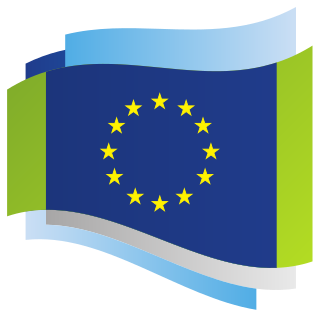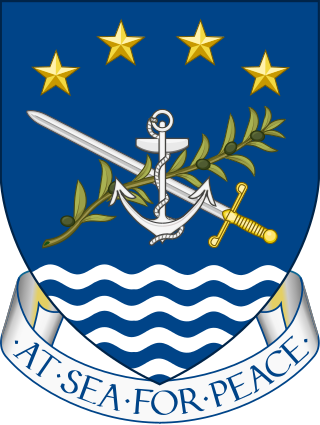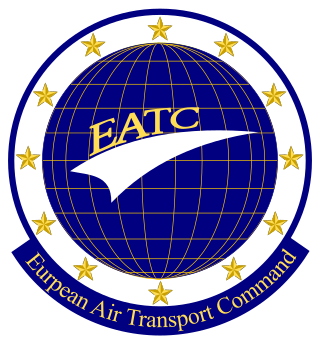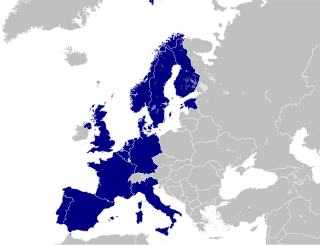See also
- Joint Personnel Recovery Agency
- European Air Group
- Finabel
- European Air Transport Command
- Common Security and Defence Policy
- United States Air Force Pararescue, a US military unit employing the same motto
| European Personnel Recovery Centre | |
|---|---|
| Active | 8 July 2015 |
| Country | Belgium France Germany Italy Netherlands Spain United Kingdom |
| Type | Personnel recovery |
| Role | multinational defence resource organisation |
| Motto(s) | That others may live |
| Website | eprc.it |
The European Personnel Recovery Centre (EPRC) is an intergovernmental military organisation that contributes to the development and harmonisation of policies and standards related to personnel recovery. The EPRC also provides support for education, training, exercises and operations. [1] The EPRC was established on 8 July 2015 and is based at Poggio Renatico Air Base in Italy.
The centre has seven participating states: [2]
The EPRC is not associated with the European Union Common Security and Defence Policy, CSDP); it is for instance not a project of the Permanent Structured Cooperation (PESCO) of the CSDP. The EPRC and its assets may however contribute in the implementation of the CSDP, when made available as a multinational force in accordance with article 42.3 of the Treaty on European Union (TEU).[ citation needed ]
The EPRC is presently led by:
The EPCR comprises the following components: [3]
The EPRC is presently not established at the EU level (referred to as the Common Security and Defence Policy, CSDP); it is for instance not a project of the Permanent Structured Cooperation (PESCO) of the CSDP. The EPRC and its assets may however contribute in the implementation of the CSDP, when made available as a multinational force in accordance with article 42.3 of the Treaty on European Union (TEU).[ citation needed ]

The Army of the Republic of North Macedonia is the military of North Macedonia. The army is organized, prepared and trained to conduct armed struggle and combat and other actions to achieve its constitutional function of defending the independence and territorial integrity of North Macedonia. The army consists of the ground forces and the air force, which are further divided into branches and services. Being landlocked, it didn't have a navy. The army has a permanent composition and reserve forces. Since 2005, it is a fully professional defense force compatible with NATO standards. On 27 March 2020, North Macedonia joined NATO as the 30th member.

The Common Foreign and Security Policy (CFSP) is the organised, agreed foreign policy of the European Union (EU) for mainly security and defence diplomacy and actions. CFSP deals only with a specific part of the EU's external relations, which domains include mainly Trade and Commercial Policy and other areas such as funding to third countries, etc. Decisions require unanimity among member states in the Council of the European Union, but once agreed, certain aspects can be further decided by qualified majority voting. Foreign policy is chaired and represented by the EU's High Representative, currently Josep Borrell.
Eurocorps, located in the French city of Strasbourg (Bas-Rhin), is a multinational corps headquarters. Founded by France and Germany in 1992, it is today composed of personnel from six framework nations and five associated nations. The framework nations place the Eurocorps at the service of the European Union (EU) and NATO, which certified it in 2002 as one of its nine High Readiness Land Headquarters.

The European Gendarmerie Force (EUROGENDFOR) is a European rapid reaction force composed of elements of several European police and gendarmerie forces. EUROGENDFOR is tasked with performing policing tasks within the scope of crisis management operations.

The Common Security and Defence Policy (CSDP) is the European Union's (EU) course of action in the fields of defence and crisis management, and a main component of the EU's Common Foreign and Security Policy (CFSP).

An EU Battlegroup is a military unit adhering to the Common Security and Defence Policy (CSDP) of the European Union (EU). Often based on contributions from a coalition of member states, each of the eighteen Battlegroups consists of a battalion-sized force reinforced with combat support elements. Two of the battlegroups were to be capable for operational deployment at any one time. The civil power that oversees these battlegroups is the Council of the European Union.

The European Defence Agency (EDA) is an agency of the European Union (EU) that promotes and facilitates integration between member states within the EU's Common Security and Defence Policy (CSDP). The EDA is headed by the EU High Representative for Foreign Affairs and Security Policy, European Commission’s Vice President (HR/VP), and reports to the Council. The EDA was established on 12 July 2004 and is based in Brussels, Belgium, along with a number of other CSDP bodies.

The European Union Satellite Centre is the agency of the European Union (EU) that supports the EU's decision-making in the field of the Common Foreign and Security Policy (CFSP), including crisis management missions and operations. It provides products and services resulting from the exploitation of relevant space assets and collateral data, including satellite and aerial imagery, and related services. SatCen is headquartered in the Torrejón Air Base, located in the Spanish municipality of the same name, in the vicinity of Madrid.

The Military Staff of the European Union (EUMS) is the directorate-general of the European Union's (EU) External Action Service (EEAS) that contributes to the EU's Common Security and Defence Policy (CSDP) by providing strategic advice to the High Representative (HR/VP) and commanding operations through its Military Planning and Conduct Capability (MPCC) operational headquarters. From the end of 2020, the MPCC will be capable of running executive operations of up to 2,500 troops, i.e. the size of one EU battle group, as well as 3 non-executive missions.

The European Maritime Force is a non-standing, military force with the current participation of France, Italy, Portugal, and Spain. The force may carry out naval, air and amphibious operations, with an activation time of 5 days after an order is received.

The European Air Transport Command (EATC) is the command centre that exercises the operational control of the majority of the aerial refueling capabilities and military transport fleets of a consortium of seven European Union (EU) member states. As of January 2015, the combined fleet under the authority of the EATC represents 75% of the European air transport capacity. Located at Eindhoven Airbase in the Netherlands, the command also bears a limited responsibility for exercises, aircrew training and the harmonisation of relevant national air transport regulations.

The Permanent Structured Cooperation (PESCO) is the part of the European Union's (EU) security and defence policy (CSDP) in which 26 of the 27 national armed forces pursue structural integration. Based on Article 42(6) and Protocol 10 of the Treaty on European Union, introduced by the Treaty of Lisbon in 2009, PESCO was initiated in 2017. The integration into PESCO is through projects which launched in 2018.
The Politico-Military Group (PMG) is a body of the Common Security and Defence Policy (CSDP) of the European Union (EU) that carries out preparatory work for the Political and Security Committee (PSC). It covers the political aspects of EU military and civil-military issues, including concepts, capabilities and operations and missions.

The Military Planning and Conduct Capability (MPCC) is a permanent operational headquarters (OHQ) at the military strategic level for military operations of up to 2,500 troops deployed as part of the Common Security and Defence Policy (CSDP) of the European Union (EU) by the end of 2020. Since its inception in 2017, the MPCC has commanded three non-executive training missions in Somalia, Mali and the Central African Republic, and will organise the training of Ukrainian forces on EU soil.

This article outlines the history of the Common Security and Defence Policy (CSDP) of the European Union (EU), a part of the Common Foreign and Security Policy (CFSP).

This article outlines the defence forces of the European Union (EU), which implement the EU's Common Security and Defence Policy (CSDP) in CSDP missions. There are two categories of EU multinational forces: ones that have been established intergovernmentally and made available to the CSDP through Article 42(3) of the Treaty on European Union (TEU), such as the Eurocorps; and the EU Battlegroups, established at the EU level.

The European Intervention Initiative (EI2) is a joint military project between 13 European countries outside of existing structures, such as the North Atlantic Treaty Organization (NATO) and the European Union's (EU) defence arm. EI2 is planned to operate a "light" permanent secretariat based on the network of military liaison officers with the French defence ministry.

This article outlines the present structure of the European Union's Common Security and Defence Policy (CSDP), a part of the Common Foreign and Security Policy (CFSP) based on articles 42–46 of the Treaty on European Union (TEU). Article 42.2 of TEU states that the CSDP includes the 'progressive framing' of a common Union defence policy, and will lead to a common defence, when the European Council of national heads of state or government, acting unanimously, so decides.

The European Union (EU) and the North Atlantic Treaty Organisation (NATO) are two main treaty-based Western organisations for cooperation between member states, both headquartered in Brussels, Belgium. Their natures are different and they operate in different spheres: NATO is a purely intergovernmental organisation functioning as a military alliance, which serves to implement article 5 of the North Atlantic Treaty on collective territorial defence. The EU on the other hand is a partly supranational and partly intergovernmental sui generis entity akin to a confederation that entails wider economic and political integration. Unlike NATO, the EU pursues a foreign policy in its own right—based on consensus, and member states have equipped it with tools in the field of defence and crisis management; the Common Security and Defence Policy (CSDP) structure.